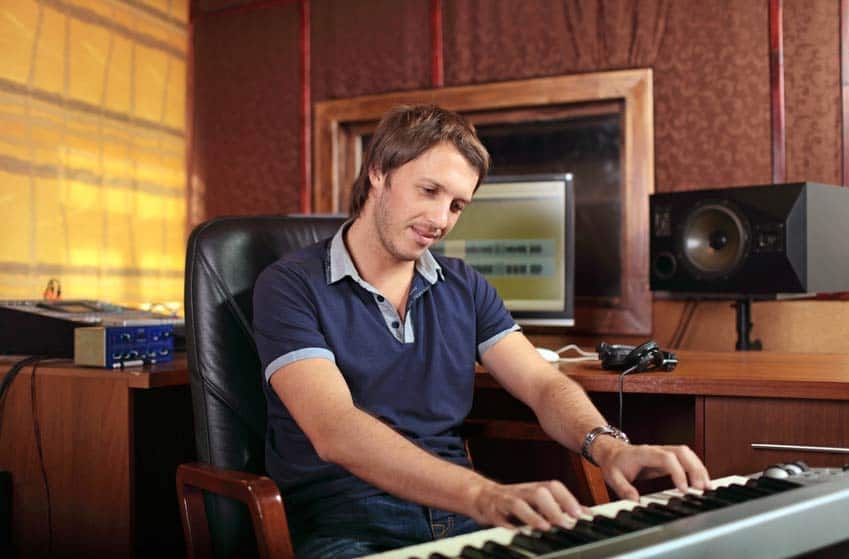Music Career Finder
Survey Start
Video Game Composer
Career Overview
Video Game Composers create musical scores for video games.
Alternate Titles
Video Game Music Composer, Composer
Salary Range
$30,000 to $75,000+

How To Become a Video Game Composer
- Career Description
- Salary
- Career Outlook
- Career Path
- Experience & Skills
- Education & Training
- Additional Resources
- Sources
Career Description
A Video Game Composer writes evocative musical scores to video games, including individual themes for each main character. To do this, he or she will watch the game to see what’s happening onscreen and create music that brings up the appropriate emotions to match what’s happening in the game.
Video Game Composer Chris Rickwood describes his daily job routine as “Wake up, sync up computers with [the] latest game builds, eat breakfast, create music and sound until lunch, eat lunch, feel drowsy and haphazardly work, read and respond to email, make sure my team is doing what they are supposed to, repeat.
“My company does everything audio for video games so my tasks vary from project management, composing, sound design and editing, voice directing, implementation, and general consulting. The people I work for are usually Game Designers, Producers, and Audio Directors. On the creative side, I work with Sound Designers, Mixers, Engineers, Recordists, Music Video Directors, Orchestrators, and Session Musicians.”
Salary
In general, Composers can earn anywhere from $30,000 to $75,000+.
Video Game Composers earn income through creative fees, production or a combination of both. They are often paid by the minute for recorded and mixed music. Composers can also earn royalties when game soundtracks are released as albums or as individual digital downloads.
Hey, what do you think about trying our new Music Career HelperMusic Career Helper really quick? It’s totally free and could help get your career moving fast! Give it a try. It’s totally free and you have nothing to lose.
Career Outlook
“I can only speak for myself but I am constantly working,” Rickwood says of the lifestyle of a Video Game Composer.”
“Even if I’m not working directly for a client, I’m working on other things like finding business, meeting people, sending invoices, and learning new techniques. The Free-to-Play business model where companies release new content at regular intervals has really changed the amount of steady work I get.”
The lifestyle of a Video Game Composer will depend on their employment situation. When they’re just getting started out, the majority of Composers work another full-time job as their main source of income, working on scores whenever they can make time. This can lead to some early mornings and late nights.
Although Video Game Composers with full-time employment usually work a regular schedule, last-minute changes or mistakes can lead to late nights spent struggling to meet a deadline. Most Video Game Composers work alone, so it can be lonely.
Career Path
Many Video Game Composers start out as freelance employees, so for them, advancement could come in the form of getting hired for a salaried in-house position. Overall, Video Game Composers—freelance or in-house—progress in their career by working on more prestigious, well-known or bigger budget video games.
To get started on the path to becoming a Video Game Composer, Rickwood advises, “Listen to music and play games in an analytic way. Write something new every day to build up your craft and portfolio. Look for some local game development meetings and start making friends.”
It’s important to keep up-to-date on which games are being developed and which stages they’re currently in. For example, a game in the early stages of development is simply in the coding stage, and its makers aren’t even thinking of hiring a Composer yet. About a year or so into the game’s development, it will have its general visual presence down, at which point a Sound Designer would get hired onto the project.
The Sound Designer will be in charge of hiring Composers. Cold calls are not always accepted, but a polite email featuring a link to the Composer’s showreel could result in getting hired on a project if the Sound Designer likes what they hear.
- “Write something new every day.”
- Network with the game development community in your area.
- Listen to and study video game music.
- Record a showreel (a short collection of musical scores you’ve written) that fits in line with the type of scores you’d like to write for games.
- Create a website to showcase your showreel.
Experience & Skills
The main skills a Video Game Composer needs, Rickwood says, are “the ability to write amazing music and convince someone your music is worth paying for. It also would help if you actually played video games and are hip to the video game culture.”
Experience with the world of gaming is important; an aspiring Video Game Composer must know the different types of games that exist and be able to pinpoint where his or her scoring skills lay. For example, a Composer’s background may be in orchestral work, in which case a game with a cinematic, larger-than-life quality might require a score with symphonic qualities.
Networking skills are vital to launching a career as a Video Game Composer. Rickwood says, “My start came from going to conferences like the Game Developers Conference and meeting everyone I possibly could. Things are different now. Video Game Developers are so ubiquitous that it is possible to find your first gig right in your local area.”
What type of personality would fare well as a Video Game Composer? Rickwood says, “I am naturally an introvert and often think I would get more work if I were more of a ‘go-getter.’ That’s just not my nature.”
“This job definitely requires you to be self-motivated, creative, hardworking, confident, and somewhat insane. Composing is somewhat of a lonely art and you live inside your head quite a bit. You need to be able to make creative choices with confidence very quickly.”
Education & Training
Although a college degree isn’t required for a Video Game Composer to put on their resume, he or she does need to have a solid understanding of traditional music scoring techniques such as orchestration and composition. They must also have a good handle on popular recording software like Logic and Protools.
Rickwood says, “You, of course, need to learn your craft. I have a couple of degrees in music and still continue to learn something new every day. I think there is a danger today that it is so easy to make music with technology that Composers are getting lazy in their writing, myself included. But if you want to excel in any industry you must evolve, up your skills, and learn the things you don’t know.”
Additional Resources
According to Rickwood, worthwhile online organizations for aspiring Video Game Composers include the Game Audio Network Guild and International Game Developers Association. He suggests that “the key is to be an active participant in any groups you join.”
Sources

Chris Rickwood
Chris Rickwood is an award-winning Composer from Atlanta, GA. His credits include Rising Storm, Orcs Must Die, Age of Empires Online, Madden NFL 12, Global Agenda, Evil Dead: Hail to the King, Ghostbusters: the Video Game, Law & Order: Criminal Intent, and Tribes: Ascend. He currently serves as a Composer/Director for Team Audio and has previously worked with Moby Games.
Rickwood has been a panelist at SXSW and participated in a Reddit AMA. He holds a MM in Composition from the University of North Texas and is a member of the Advisory Board for Atlantic International University’s (AIU) Game Design program and the Advisory Committee for the Art Institute of Atlanta’s Game Art and Design Program.
Additionally, he serves on the Advisory Board for the Game Audio Network Guild (G.A.N.G.), the Advisory Board of the International Game Developers Association Atlanta Chapter, and the Board of Directors for the Georgia Game Developers Association.